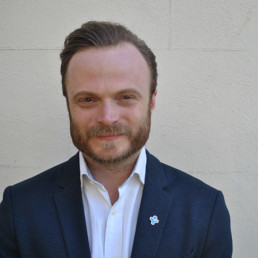
Written by Dominic Arnall
Chief Executive of Just Like Us, the LGBT+ young people's charity.
The pandemic has hit us all hard – whether it’s through job losses, being furloughed, losing loved ones, loneliness or our lives simply turning upside down. However, new independent research by Just Like Us has found that young people who are LGBT+ (lesbian, gay, bisexual or trans) are struggling significantly more.
LGBT+ young people are twice as likely to feel lonely and more than twice as likely to be worrying daily about the state of their mental health.
On top of this, one in four (25%) are facing daily tensions in the place they’re living and seven in 10 (68%) said their mental health has worsened during the pandemic, compared to just half (49%) of young people who aren’t LGBT+.
Sadly, Just Like Us’ independent research found what we suspected to be true when the pandemic began – LGBT+ young people are facing far more challenges than their peers and this is having a devastating impact on their mental health. And we found that LGBT+ young people who are also Black, disabled and/or eligible for free school meals face even worse mental health.
While we’ve all had a tough time not being able to see our loved ones and socialise like we used to, many LGBT+ young people are having to cope with living with families who may not accept or understand them, while also being cut off from their usual support networks or safe spaces where they won’t be judged for who they are.
School, while it may have been virtual for much of the pandemic, can be a fantastic source of support for young people. Sadly, for pupils who are LGBT+, school still often isn’t a place they are able to feel safe, welcome or happy being themselves.
Our research shows that half (48%) of 11 to 18 year olds say they have received little to zero positive messaging at school about being LGBT+ in the last 12 months. One in five (18%) young people say they have received no positive messaging from their school about being LGBT+, which suggests that a significant number of schools are not taking action to meet Ofsted requirements of preventing homophobic, biphobic and transphobic bullying.
It’s a real shame to see that Section 28 is still having such an impact on LGBT+ young people’s experiences of school. As adults, we could be forgiven for thinking that things have moved on – after all, we have far more legislation to protect us these days – but education still has a long way to go in being LGBT+ inclusive.
No child should feel scared to be themselves at school. And pupils in primary schools should know that there’s no shame in having LGBT+ parents or families either. Growing up bisexual, if I’d known and could’ve seen that my school accepted me, my journey would’ve looked very different.
We know that teachers and school staff are doing an incredible job in an overwhelmingly challenging environment. That’s why we are doing everything we can at Just Like Us to make taking the first step to LGBT+ inclusion in education as easy and accessible as possible.
This summer is School Diversity Week. We’re asking all primary schools, secondary schools and colleges to please sign up to take part. It’s free, you’ll get a toolkit of teaching resources for all key stages, across the curriculum, and celebrating means your pupils will know they can be safe, happy and accepted at your school.
We’ll be running free online masterclasses that you can stream, there’ll be Rainbow Friday where pupils can dress up as a colour from the Pride Progress flag, and we have many new resources for staff to inspire your celebrations. LGBT+ young people are facing disproportionate mental health challenges and need to know who they are is not something to be ashamed of – please sign up for School Diversity Week and celebrate with us and thousands of schools and colleges taking part 21-25 June.

